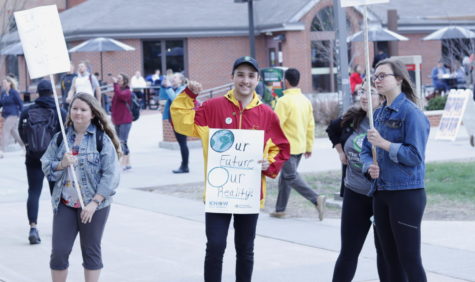Homestead helps autistic
October 2, 2000
The Homestead, a facility for adults with autism, is improving the skills of its consumers through the management and production of a 360-tree organic apple orchard. ISU professors and faculty assisted Homestead staff develop the orchard program three years ago, and ISU horticulture students help maintain the orchard. Autism is a neurological disorder that is categorized with Down Syndrome and mental retardation, said Janna Bouwkamp, vocational director of the Homestead. “[Autism] is different because it’s neurological and the consumers have problems with communication,” she said. “The consumers are visual learners, and it is easier to bring information to them visually [through the orchard].” Bouwkamp said harvesting the apples is one part of their produce farm where the products are sold to the community. The orchard gives the consumers an opportunity to be employed, and it also helps them diversify their skills and tasks they enjoy doing. “It’s important the consumers do the work. They did all of the weeding, mowing and watering. They also work hard to make the orchard work,” Bouwkamp said. Kathleen Delate, assistant professor of horticulture and agronomy, took a group of horticulture students to the orchards so they could learn about maintaining an orchard. She said the Homestead wanted the orchard to be grown organically because of its financial and health benefits. “No pesticides were used, so the environment was used to its full potential,” Delate said Laura Miller, communications specialist for the Leopold Center for Sustainable Agriculture at Iowa State, said the center gives the Homestead about $8,000 to help manage the organic orchard. The grant, which has been given for all three years of the project, is renewed annually. “I think that the project is very unique because the consumers have been involved from the very beginning,” said Geoff Abelson, professor of curriculum and instruction. “It was a very big deal for them to get the money, and it has allowed them to do many things.” Abelson, who is also a member of the Homestead Board of Directors, said the organization was looking for ways to raise money. It received money through the Leopold grant and Prairie Meadows Racetrack and Casino. Linda Naeve, a former ISU Extension horticulturist, said she was contacted in 1997 by Steve Muller, executive director of the Homestead. They came up with ideas for the project and narrowed them down to the orchard because it suited the consumers’ needs and met the mission and objective of the Homestead. “There have been numerous students and faculty members who have been involved in the project,” she said. “There have also been students from Central College in Pella who have participated. It has provided Iowa State with research materials about organic pest management and fertility management.” Muller said the organization was started six years ago by families who came together to focus on autism. It was founded as a way to help the consumers. The Homestead directs its services to kids and adults and gives them the opportunity to work on an agriculture campus, Muller said. “The orchard helps provide solutions to the consumers’ problems and gets Iowa State students involved,” said Muller. “Getting students involved teaches them to manage their own orchards and gives us a chance to teach them about autism. Hopefully, the students will hire autistic people to work for them or at least make the students understand the consumers better.”
















